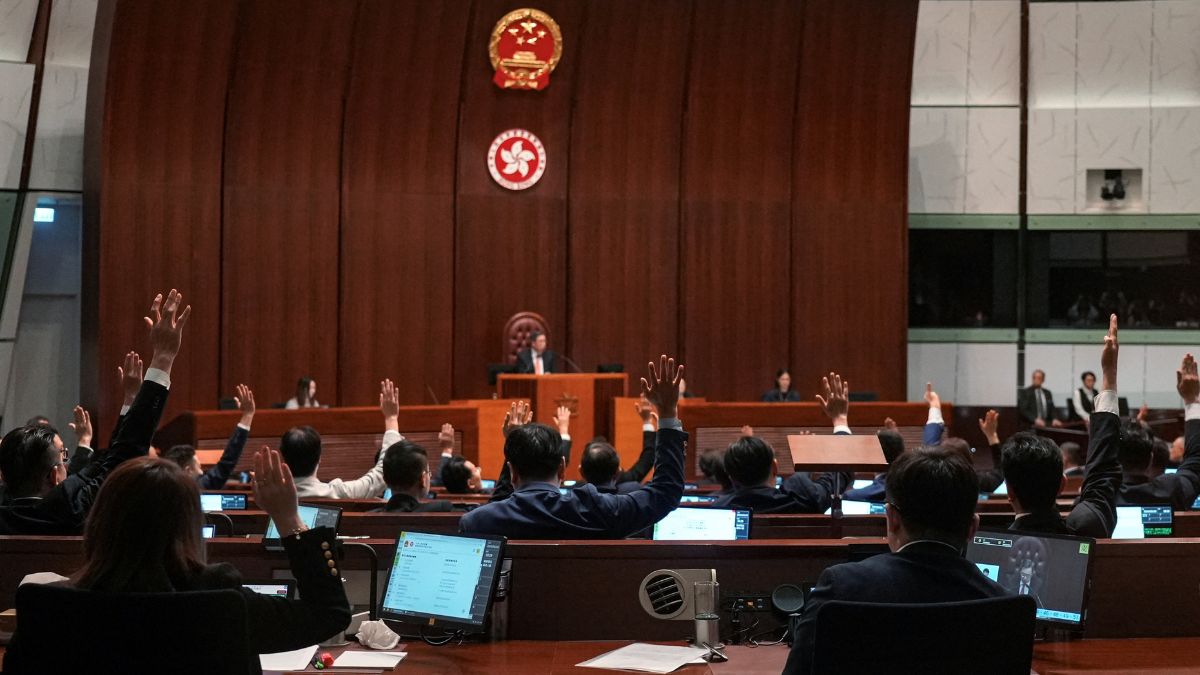Hong Kong legislators unanimously approved a national security law Tuesday that imposes severe penalties, including life imprisonment for treason and insurrection, and up to 20 years for the theft of state secrets.
This development has raised alarms in the United States, Britain, and the European Union, which have expressed concerns over the potential further erosion of freedoms in Hong Kong. The law was expedited through the legislative process, attracting criticism from international observers.
The UN’s rights chief, Volker Turk, criticised the law’s swift passage, labeling it “a regressive step for the protection of human rights”. In contrast, Hong Kong’s city leader, John Lee, heralded the law’s enactment as “a historic moment for Hong Kong”, announcing its implementation to commence on Saturday.
This legislation, often referred to as Article 23, marks the government’s second attempt at introduction; an initial effort in 2003 was abandoned following mass protests by approximately half a million Hong Kong citizens.
John Lee referenced the city’s “constitutional responsibility” under the Basic Law—Hong Kong’s mini-constitution since its transition from British to Chinese rule in 1997—to enact the new law. This local law is set to complement the national security law Beijing imposed in 2020, following extensive and sometimes violent pro-democracy demonstrations in Hong Kong.
The new law punishes dozens of offences under five categories: treason, insurrection, theft of state secrets and espionage, sabotage endangering national security, and external interference.
Lee had said it was needed to plug the legislative gaps left by Beijing’s version, which targets secession, subversion, terrorism and collusion with foreign forces.
Impact Shorts
More ShortsThe law “will allow Hong Kong to effectively prevent, suppress and punish espionage activities, conspiracies and traps from foreign intelligence agencies, and infiltration and sabotage carried out by hostile forces”, he said Tuesday.
He added that it would also “effectively prevent black-clad violence”, a reference to the 2019 pro-democracy protests that were quashed.
One of the last-minute amendments added to the law last week empowers Lee and his cabinet to create new offences – to account for “unforeseen circumstances” – punishable by up to seven years in prison.
- ‘An effective lock’ -
Sanctioned by the United States for his oversight of the crackdown on the protests while security chief, Lee has called the law “an effective lock to prevent burglars” as authorities seek to combat “threats posed by external forces”.
Penalties run up to life in prison for sabotage endangering national security, treason and insurrection, 20 years for espionage and sabotage, and 14 years for external interference.
It has also expanded the British colonial-era offence of sedition to include inciting hatred against China’s Communist Party leadership, with an aggravated sentence of up to 10 years in jail.
As with its 2020 predecessor, the new law claims jurisdiction over some offences committed outside Hong Kong.
But the Beijing-run national security office in Hong Kong said “only an extremely small number of people” would be punished under Article 23, mirroring language used in the run-up to the original security law’s imposition.
Nearly 300 people have so far been arrested under that law, while dozens of politicians, activists and other public figures have been jailed or forced into exile.
Calling it “a new Great Wall of rule of law”, the security office said in a statement that “the majority of Hong Kong residents and international investors will benefit” from it.
- ‘A regressive step’ -
As part of the 1997 handover from Britain, Hong Kong was guaranteed certain freedoms – as well as judicial and legislative autonomy – for 50 years in a deal known as “one country, two systems”.
The accord has helped cement the city’s status as a world-class business hub, bolstered by a reliable judiciary and political freedoms distinct from the mainland.
Britain’s foreign minister David Cameron said the new law would “further damage the rights and freedoms enjoyed” in Hong Kong and have “far-reaching implications” for the rule of law and independence of institutions.
State Department spokesman Vedant Patel meanwhile told reporters Tuesday that the United States was “alarmed by the sweeping and what we interpret as vaguely defined provisions” in the law.
And the Amnesty International rights group called the law “draconian”.
“The passing of this law sends the clearest message yet that the Hong Kong authorities’ hunger to accommodate Beijing’s will outstrips any past commitments on human rights,” said Amnesty’s China specialist Sarah Brooks.
With inputs from AFP


)

)
)
)
)
)
)
)
)



